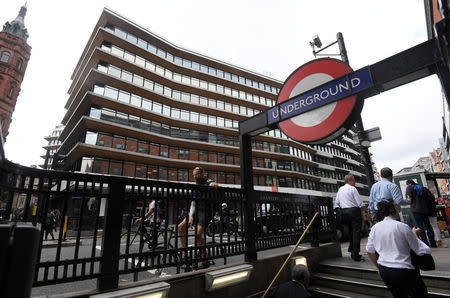Bell Pottinger dumped by PR association, HSBC, over South Africa campaign

By Emma Rumney LONDON (Reuters) - Leading PR agency Bell Pottinger was thrown out of its British industry association on Tuesday and lost global banking giant HSBC as a client over a campaign judged to have deliberately stoked racial tensions in South Africa. HSBC said it would no longer work with the firm following the news that it had been expelled from the Public Relations and Communications Association (PRCA). South African investment bank Investec, mining company Acacia, luxury goods firm Richemont and smaller UK bank CYBG have also dropped their Bell Pottinger accounts recently. The trade association, which represents 400 businesses and 20,000 individuals, found that Bell Pottinger had backed a campaign that played on frayed race relations in support of South African President Jacob Zuma and his ruling party. "The view of the PRCA board was that Bell Pottinger's actions were deliberately intended to create exactly the result they did -- stirring up racial hatred in a very sensitive area of the world," Francis Ingham, PRCA director general, said. In a statement, Bell Pottinger said it accepted there were lessons to be learned from its South Africa campaign but disputed "the basis on which the (PRCA) ruling was made". It said it would continue to abide by the PRCA's code of ethics. The expulsion came into effect on Tuesday for a minimum of five years, after which the firm can reapply. It is the harshest sanction possible and unprecedented for such a prominent member. Bell Pottinger was paid 100,000 pounds ($129,000) a month by Oakbay, the holding company of the Indian-born Gupta family, which has been accused of using its closeness to Zuma to win government contracts. Zuma and the Guptas deny any wrongdoing. South Africa's main opposition party, the Democratic Alliance, had complained about the campaign, which portrayed opponents of President Jacob Zuma as agents of "white monopoly capital", with slogans referring to "economic apartheid". Such slogans gained traction in a country where the white minority still wields disproportionate economic power, two decades after the end of apartheid. "This ruling is by no means an indication that Bell Pottinger is off the hook just yet," DA spokeswoman Phumzile van Damme said on Tuesday. "Bell Pottinger must take responsibility for their actions and disclose all information regarding their Oakbay Capital account." Bell Pottinger is no stranger to controversy. Its clients have included Syrian first lady Asma al-Assad, the Pinochet Foundation, which promotes the legacy of the former Chilean dictator, and other governments and firms criticised for human rights abuses or corruption. This most recent scandal has prompted the firm's CEO to resign and the dismissal or suspension of four members of staff. REPUTATION While Bell Pottinger can continue to operate, the ruling will take its toll in an industry that trades on reputation. The firm had previously commissioned an independent report into the matter by law firm Herbert Smith Freehills. It found some of the campaign's material was potentially racially divisive and offensive, but rejected allegations that the company was behind so-called Twitterbots which artificially amplified apparent public support. In July, the firm's chief executive James Henderson issued an "unequivocal and absolute" apology to anyone affected, fired the lead partner involved in the campaign and suspended another partner and two other employees. On Monday, after reading the independent report, Henderson resigned. He said while he had ultimate responsibility for Bell Pottinger, he had been "misled" over the campaign by colleagues. Tim Bell, co-founder of Bell Pottinger and the PR veteran who made his name by advising Britain's Margaret Thatcher, said it was "close to the end" for the agency. He said one reason he resigned as chairman of the firm in August 2016 was because of its work in South Africa -- although he had played a part in securing the Oakbay account. "It was inevitable, and I'm not surprised," he said of the PRCA expulsion. "I think it's very sad that something that I ran for years and years has been destroyed in less than a year," he told Reuters by telephone. (Reporting by Emma Rumney Additonal reporting by Tiisetso Motsoeneng in Johannesburg; editing by Jeremy Gaunt)

